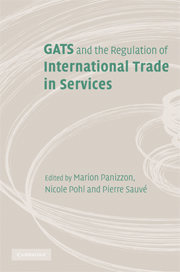Book contents
- Frontmatter
- Contents
- Contributors
- List of figures
- List of tables
- List of abbreviations
- Preface
- PART 1 Beyond regulatory control and multilateral flexibility: Gains from a cosmopolitan GATS
- PART 2 Unexplored economic, political and judicial dimensions of GATS
- PART 3 The limits of request–offer negotiations: Plurilateral and alternative approaches to services liberalisation
- PART 4 GATS case law: A first assessment
- 10 Lessons learned from litigating GATS disputes: Mexico – Telecoms
- 11 From Periodicals to Gambling: A review of systemic issues addressed by WTO adjudicatory bodies under the GATS
- 12 Specificities of WTO dispute settlement in services cases
- 13 Can foreign investors in services benefit from WTO dispute settlement? Legal standing and remedies in WTO and international arbitration
- PART 5 Market access, national treatment and domestic regulation
- PART 6 Unfinished business: Safeguard and subsidy disciplines for services
- PART 7 Challenges to the scope of GATS and cosmopolitan governance in services trade
- PART 8 Conclusion
- Index
- References
13 - Can foreign investors in services benefit from WTO dispute settlement? Legal standing and remedies in WTO and international arbitration
from PART 4 - GATS case law: A first assessment
Published online by Cambridge University Press: 03 September 2009
- Frontmatter
- Contents
- Contributors
- List of figures
- List of tables
- List of abbreviations
- Preface
- PART 1 Beyond regulatory control and multilateral flexibility: Gains from a cosmopolitan GATS
- PART 2 Unexplored economic, political and judicial dimensions of GATS
- PART 3 The limits of request–offer negotiations: Plurilateral and alternative approaches to services liberalisation
- PART 4 GATS case law: A first assessment
- 10 Lessons learned from litigating GATS disputes: Mexico – Telecoms
- 11 From Periodicals to Gambling: A review of systemic issues addressed by WTO adjudicatory bodies under the GATS
- 12 Specificities of WTO dispute settlement in services cases
- 13 Can foreign investors in services benefit from WTO dispute settlement? Legal standing and remedies in WTO and international arbitration
- PART 5 Market access, national treatment and domestic regulation
- PART 6 Unfinished business: Safeguard and subsidy disciplines for services
- PART 7 Challenges to the scope of GATS and cosmopolitan governance in services trade
- PART 8 Conclusion
- Index
- References
Summary
Introduction
Disputes involving trade and investment in services are a rarity in the WTO. Up to now, the WTO dispute settlement mechanism (DSM) has addressed over 130 cases, of which only a handful concerned services. Furthermore, only two disputes were true General Agreement on Trade in Services (GATS) cases, as the other three were primarily ‘goods’ cases, with only a secondary services dimension concerning the disciplines on the importation of goods – bananas and cars.
In addition, investment in services has received minimal consideration in these disputes. Of the two GATS cases, only Mexico – Telecom paid some attention to trade in services through ‘commercial presence’ (or ‘mode 3’, GATS jargon for ‘foreign investment’), but the dispute concerned mostly cross-border trade. The three goods cases involving the GATS also said little about the disciplines concerning investment in services, although some clarifications can be found in the bananas case.
It is possible to identify three reasons that may explain, at least partially, the marginal attention that WTO dispute settlement has paid to investment in services.
First, multilateral commitments in services, like tariff bindings in goods, feature an important level of ‘water’ between bound policies and applied measures. That is, domestic policies towards foreign services suppliers are commonly more liberal than those to which Members have committed under GATS rules. Indeed, the GATS has been accused of providing for very little real liberalisation.
- Type
- Chapter
- Information
- GATS and the Regulation of International Trade in ServicesWorld Trade Forum, pp. 296 - 324Publisher: Cambridge University PressPrint publication year: 2008
References
- 1
- Cited by



